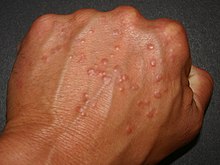Generalized granuloma annulare is a skin condition of unknown cause, tending to affect women in the fifth and sixth decades, presenting as a diffuse but symmetrical, papular or annular eruption of more than ten skin lesions, and often hundreds.[1]: 703
| Generalized granuloma annulare | |
|---|---|
 | |
| Specialty | Dermatology |
Signs and symptoms
editGeneralized granuloma annulare is a chronic granulomatous dermatosis that typically affects young adults' distal extremities and manifests as annular grouped papules.[2] On the trunk and extremities, numerous flesh-colored papules arranged in an annular pattern are the hallmark of generalized granuloma annulare. These lesions are frequently itchy, in contrast to the traditional presentation.[3]
Causes
editA variety of factors, such as infection, sun exposure, medication use, and trauma, appear to play a role in the development of the disease.[4]
Diagnosis
editIt has been observed that certain laboratory abnormalities exist, such as hyperlipidemia, hypergammaglobulinemia, and the presence of circulating antinuclear antibodies.[5] Histopathologic analysis may show lymphohistiocytic granuloma-related alterations primarily in the papillary and mid dermis. Palisaded or interstitial patterns, or a combination of the two, may be seen in inflammatory infiltrates.[4]
Treatment
editGeneralized granuloma annulare is mostly treated with phototherapy as opposed to oral steroids, however treatment efficacy is constrained by a high rate of recurrence after stopping treatment.[6]
Epidemiology
editGeneralized granuloma annulare accounts for up to 15% of granuloma annulare cases.[3]
See also
editReferences
edit- ^ James, William D.; Berger, Timothy G.; et al. (2006). Andrews' Diseases of the Skin: clinical Dermatology. Saunders Elsevier. ISBN 978-0-7216-2921-6.
- ^ Mangold, Aaron R.; Cumsky, Helen J.L.; Costello, Collin M.; Xie, Daniel Y.; Buras, Matthew R.; Nelson, Steven A.; DiCaudo, David J.; Sekulic, Aleksandar; Pittelkow, Mark R. (2018). "Clinical and histopathologic features of paraneoplastic granuloma annulare in association with solid organ malignancies: A case–control study". Journal of the American Academy of Dermatology. 79 (5). Elsevier BV: 913–920.e1. doi:10.1016/j.jaad.2018.06.022. ISSN 0190-9622. PMID 29920319. S2CID 49309849.
- ^ a b Schmieder, Shawn J.; Harper, Chelsea D.; Schmieder, George J. (June 21, 2023). "Granuloma Annulare". StatPearls Publishing. PMID 29083715. Retrieved February 5, 2024.
- ^ a b Lee, Jun Hyo; Cho, Soyun (2022). "Resolution of refractory generalized granuloma annulare after treatment with alitretinoin". JAAD Case Reports. 24. Elsevier BV: 38–41. doi:10.1016/j.jdcr.2022.04.006. ISSN 2352-5126. PMC 9118481. PMID 35600571.
- ^ Dabski, Krzysztof; Winkelmann, R.K. (1989). "Generalized granuloma annulare: Clinical and laboratory findings in 100 patients". Journal of the American Academy of Dermatology. 20 (1). Elsevier BV: 39–47. doi:10.1016/s0190-9622(89)70005-0. ISSN 0190-9622.
- ^ Lukács, J.; Schliemann, S.; Elsner, P. (February 4, 2015). "Treatment of generalized granuloma annulare – a systematic review". Journal of the European Academy of Dermatology and Venereology. 29 (8). Wiley: 1467–1480. doi:10.1111/jdv.12976. ISSN 0926-9959. PMID 25651003. S2CID 20884856.
Further reading
edit- Saber, Mina; Khalili Tembi, Roghaye Sadat; Asilian, Ali (2021). "Generalized granuloma annulare in a case of breast cancer: A case report and review of the literature". Clinical Case Reports. 9 (10): e04980. doi:10.1002/ccr3.4980. ISSN 2050-0904. PMC 8521271. PMID 34703610.
- Polineni, Sai P.; Lawyer, Steven (2020). "Generalized granuloma annulare associated with essential thrombocythemia". Clinical Case Reports. 8 (6): 1065–1068. doi:10.1002/ccr3.2812. ISSN 2050-0904. PMC 7303850. PMID 32577266.